 Petzlover
Petzlover Havanese is originated from Cuba but Sakhalin Husky is originated from Japan. Havanese may grow 39 cm / 15 inches shorter than Sakhalin Husky. Havanese may weigh 34 kg / 74 pounds lesser than Sakhalin Husky. Both Havanese and Sakhalin Husky has almost same life span. Both Havanese and Sakhalin Husky has almost same litter size. Havanese requires High Maintenance. But Sakhalin Husky requires Moderate Maintenance
Havanese is originated from Cuba but Sakhalin Husky is originated from Japan. Havanese may grow 39 cm / 15 inches shorter than Sakhalin Husky. Havanese may weigh 34 kg / 74 pounds lesser than Sakhalin Husky. Both Havanese and Sakhalin Husky has almost same life span. Both Havanese and Sakhalin Husky has almost same litter size. Havanese requires High Maintenance. But Sakhalin Husky requires Moderate Maintenance
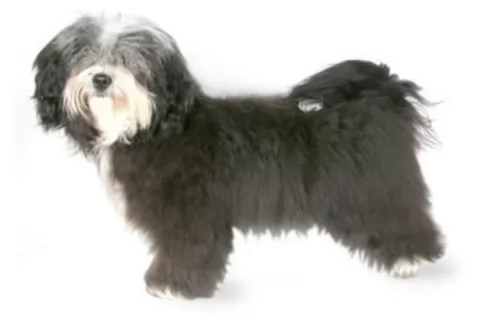 The only breed of dog that is native to Cuba is the Havanese. These little dogs are great companion animals. Sociable and happy, they are very popular in the United States with urbanites. These happy little pups are a Bichon type of dog which was developed from the “Little White Dog of Havana” or the Blanquito de la Habana which is now extinct.
The only breed of dog that is native to Cuba is the Havanese. These little dogs are great companion animals. Sociable and happy, they are very popular in the United States with urbanites. These happy little pups are a Bichon type of dog which was developed from the “Little White Dog of Havana” or the Blanquito de la Habana which is now extinct.
The Blanquito de la Habana was itself developed from another extinct breed the Bichon Tenerife. Then the Blanquito was bred with the other Bichons and poodles in developing the Havanese. It is believed that some of the first people to settle in Cuba were from Tenerife, an island close to Cuba. In the early part of the sixteenth century, little white dogs were brought to Cuba with these settlers. This dog of Tenerife is believed to be the ancestor of all Bichon breeds.
At that time trade with Cuba was highly restricted by the Spanish and so these dogs developed without any crossing from other breeds from outside the country. They grew to be able to stand hot temperatures and they grew a very unique coat – almost like silk. Their coat is soft and light, while insulating them from the tropical environment.
At this time Cuba was the place to be for Europeans aristocrats on vacation. Unlike the British colonies, Cuba had theatres, operas and palacious. When going back to Europe, many took this little white dog with them to France, Spain and England. The Dog of Havannah was a favorite on European soil as well. Many of these dogs taken to Europe were fawn or parti instead of white. Meanwhile back in Cuba, the bourgeoisie were replacing the aristocracy who themselves would soon be replaced by the Revolution.
During the days of the bourgeoisie, the Havanese became very popular household pets. The breed has been a family pet for the last 150 years. At the same time the breed was very trendy in Europe with Charles Dickens and Queen Victoria owning several. They were by now familiar participants in Europe’s dog shows. Finally, with the Revolution, the bourgeoisie left the country in droves with their little white dogs. A genetic pool was then formed in the US. Gene pool from 11 dogs. All the Havanese in the world are descended from those 11 dogs with the exception of the dogs isolated in Cuba and the US. Today the Havanese is one of the most popular and fastest growing breeds in the world.
 Known also as the Karafuto-Ken, the Sakhalin Husky is a dog that has been used as a sled dog, but which is now almost extinct.
Known also as the Karafuto-Ken, the Sakhalin Husky is a dog that has been used as a sled dog, but which is now almost extinct.
Hailing from Japan, it is believed that in 2011, there were only two surviving members of the breed in Japan. There isn’t much history on these dogs, but we do know that it is an old breed. They've been used by explorers to the South Pole. One such explorer was Robert Falcon Scott.
They’re extremely tough dogs, known for enduring in the snow under extreme conditions. The dog breed isn’t recognized as a standardized breed by any of the major kennel clubs.
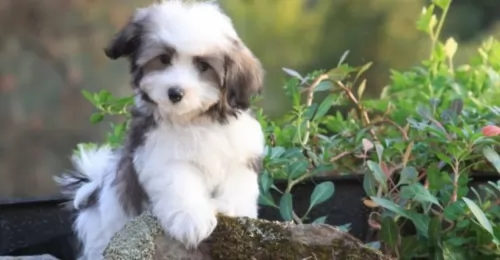 The Havanese is a sturdy little dog, a member of the toy group. They weigh no more than 16 pounds (7.3kg) and his body is longer than it is tall. The breed has a unique topline that is not level, but it is straight. His front legs are longer than his hind legs producing the lively gait everyone is used to seeing with a Havanese. With a full muzzle that tapers to the nose, the Havanese does not seem to be short. The skull’s length is the same as the muzzle’s. The head of the Havanese is round in the back and flat in the front.
The Havanese is a sturdy little dog, a member of the toy group. They weigh no more than 16 pounds (7.3kg) and his body is longer than it is tall. The breed has a unique topline that is not level, but it is straight. His front legs are longer than his hind legs producing the lively gait everyone is used to seeing with a Havanese. With a full muzzle that tapers to the nose, the Havanese does not seem to be short. The skull’s length is the same as the muzzle’s. The head of the Havanese is round in the back and flat in the front.
They have a deep chest, almond shaped eyes that are dark brown and their ears are about halfway down the nose. The long ears hang down the side od the face. They have a long plumed tail that is held high and upward. The standard for the breed and now the laws of the United Kingdom state that there can be no docking of the tail.
 This is a medium sized dog standing at between 56 and 66cm in height and weighing between 30 and 40kg. His coat is thick and can be in a number of colours such as brown, tan, cream, grey or black. The ears are small and pointed and slightly tilted forwards. The tail is long and sometimes curls over the back while at other times it is held straight or down.
This is a medium sized dog standing at between 56 and 66cm in height and weighing between 30 and 40kg. His coat is thick and can be in a number of colours such as brown, tan, cream, grey or black. The ears are small and pointed and slightly tilted forwards. The tail is long and sometimes curls over the back while at other times it is held straight or down.
These dogs are known for their loyalty, affection and bravery. The dog is highly intelligent and will respond well to training and socialization.
It's a rare dog breed, calm and confident. A perfect example of their amazing characteristics is seen in the film ‘Eight Below’ where these wonderful dogs were left behind on a scientific expedition that went wrong.
The dogs had to struggle for survival in the frozen wilderness. The Sakhalin Husky just wants to please, and is alert and intelligent, doing well in a family where there are children.
Statues have been erected to honor these Sakhalin Huskies who died on some of these ill-fated expeditions.
These dogs are totally devoted to their owners and they’re full of confidence, they’ve got immense strength and they need a lot of physical stimulation every day.
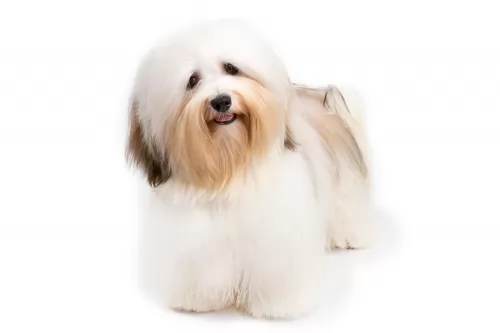 Havanese are highly intelligent and eager to please, and they are easily trained so long as you use only positive methods. This can be a sensitive breed, so care must be taken to not scold them harshly. Socialization from an early age is very important. Expose them calmly to a wide variety of new places and new people, always ensuring that the experiences are positive and not intimidating. Gentle, patient training will result in a wonderful companion dog. They are affectionate with people and get along with other nonaggressive pets.
Havanese are highly intelligent and eager to please, and they are easily trained so long as you use only positive methods. This can be a sensitive breed, so care must be taken to not scold them harshly. Socialization from an early age is very important. Expose them calmly to a wide variety of new places and new people, always ensuring that the experiences are positive and not intimidating. Gentle, patient training will result in a wonderful companion dog. They are affectionate with people and get along with other nonaggressive pets.
The Havanese is the consummate lap dog. Over time they have become the lovable family companion.
The breed is pretty adaptable being able to live as a companion animal in almost any setting. Just don’t expect your Havanese to go hiking or romp with you on 40 acres in the country.
They are intelligent, love to learn but can be a little stubborn. Train them early as they like their habits and its much harder to train an older Havanese.
 When you bring these dogs into your home, you’re bringing in lots of excellent characteristics.
When you bring these dogs into your home, you’re bringing in lots of excellent characteristics.
He is loyal, affectionate and smart. With his above average intelligence, you can easily train him. He is also a playful breed and the kids will enjoy him as a good playmate.
They’re gentle dogs too and will do well in a home where people are fair, patient, kind and consistent with their handling of him. Known to be an excellent therapy dog, having this dog in your home will enhance your quality of life.
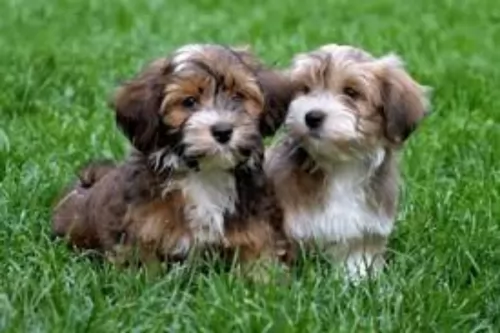 A very healthy breed, the Havanese doesn’t have a lot of health issues, but they are not immune to the problems of small breed dogs. The issues they do have are:
A very healthy breed, the Havanese doesn’t have a lot of health issues, but they are not immune to the problems of small breed dogs. The issues they do have are:
 The brave Sakhalin Husky can live to be between 12 and 14 years of age but these dogs can succumb to quite a few of the common dog diseases there are -
The brave Sakhalin Husky can live to be between 12 and 14 years of age but these dogs can succumb to quite a few of the common dog diseases there are -
This is a hereditary disease of the cornea. You’ll see small white dots in his cornea and the dog can experience hazy vision.
This problem with the hips can be debilitating for your sled dog, and both hips can be affected. It can be painful for your dog as arthritis sets in. It is important to see that your dogs don’t put on weight as this puts pressure on the joints. Your dog will need to see the vet, and surgery might be a treatment option.
This is a condition that affects Huskies between 3 and 4 months of age and can result in hair loss or problems with the skin. It is actually fairly rare in dogs and diagnosed by microscopic examination of the hair shaft. You will need to get your pet to the vet because it can lead to alopecia.
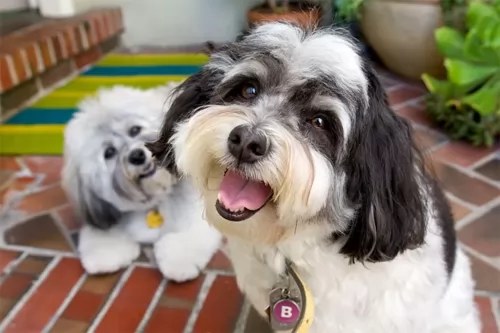 Feed 3 to 4 times per day a high quality dry puppy food for toy or small dogs. Feed ¼ to ½ cup each time.
Feed 3 to 4 times per day a high quality dry puppy food for toy or small dogs. Feed ¼ to ½ cup each time.
Remember these are small dogs and don’t overfeed. Feed a high quality dry food for small or toy dogs. Feed twice a day at about ½ cup each time.
The breed is generally very healthy.
This breed is not an overly active dog, but he does need some exercise. A nice walk once a day or a backyard to play in. They play inside as well as out. Don’t over exercise the Havanese. They do well in obedience and confirmation more so than agility or fly ball
 Feed your Sakhalin Husky a commercially manufactured dog formula that caters to his energy and digestive needs.
Feed your Sakhalin Husky a commercially manufactured dog formula that caters to his energy and digestive needs.
Choose high-quality dog food with natural ingredients. Try and include some home-made food into your dogs diet. Boiled chicken, brown rice or pasta, sweet potatoes, carrots and spinach will do him wonders and you can chop it up and add some into the dry kibble as a treat twice a week.
Some raw meat occasionally is also important to prevent skin problems. Be sure that cool, fresh water is available for your pet at all times.
This will require regular exercise. Walks are always good, but he will require something more hectic such as long hikes and frisbee or ball throwing games.
A Husky’s dense double-coat must be brushed at least twice a week as he is a fairly heavy shedder.
His nails grow quickly and these will need to be trimmed. Even though he has erect ears, you will need to check inside for cleanliness to avoid canine ear infections.
Check inside his mouth as well for bad teeth as these can have a detrimental affect on his health